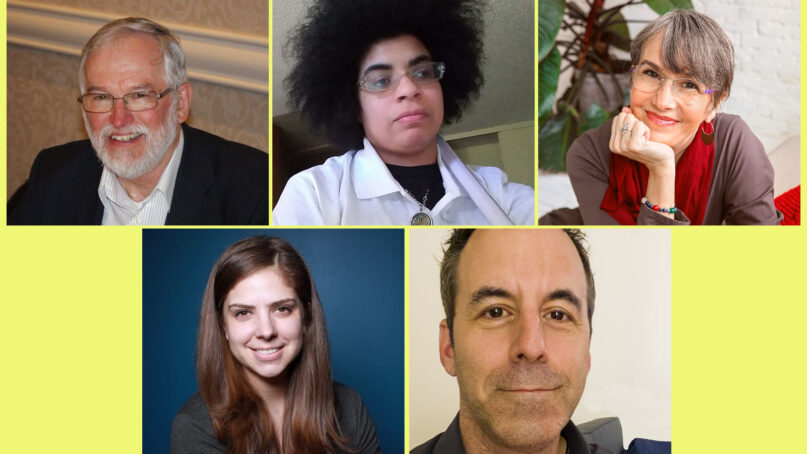(RNS) — Traditionally, clergy operate at their community’s center.
The faithful can find their leader in the shared location where they gather — the mosque, church or synagogue. But for some, following a call to minister has meant going to the margins — to the digital pastures of TikTok or prison ministry at Rikers Island. From rural chaplains ministering in remote areas to ex-journalists searching for “right livelihood” in the distractions of New York City, these ministers followed their spiritual calling to unexpected ends.
- Looking for ‘right livelihood’ — Alexandra Gekas, Zen seminarian
- ‘You don’t have to fit a mold’ — Rosalyn Johnson, Jedi Minister
- ‘That’s not a God I want to worship’ — Rev. Karla Kamstra, interfaith pastor
- ‘A heart for rural life’ — Roger Grace, rural chaplain
- ‘Who am I to be offering this?’ — Lance JiGan Kaplan, Zen hospice chaplain
Looking for ‘right livelihood’ — Alexandra Gekas, Zen seminarian
Despite growing up in what she calls a “Jesus loves you, don’t be a jerk” form of Midwestern Christianity, Alexandra Gekas was drawn to Buddhism at a young age — or, at least, to the Buddha. She would swipe small statues of the Buddha off restaurant hostess stands until she had accumulated a formidable collection.
“Eventually, I became known for this,” she says. “And people would give me Buddhas as a gift.”
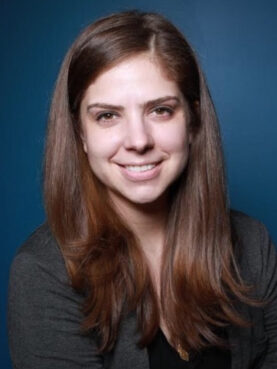
Alexandra Gekas. Courtesy photo
“I didn’t think of it as stealing. You know, I think I was just really curious,” she added.
That curiosity has led to her current work of training as a Zen chaplain. As a student at Union Theological Seminary training to be a Zen chaplain, she has worked at Rikers Island and in addiction recovery programs. She’s discerning where she will go next.
Gekas moved from Chicago to New York City to work in digital journalism in the thick of the 2008 recession but said she grew frustrated with the job.
“I came to journalism because I had an activist spirit and I wanted to inform the masses about what’s going on in the world,” she said.
“Nobody knew what they were doing. It was a lot of pressure — not to go out and get the story, but the pressure to get more clicks, make more money.”
After her first Buddhist retreat, she found herself in a cycle she described as “drinking too much and partying too much, and then when I would be like, ‘I gotta get my life together.’”
After a month or so of meditation, she would resume partying.
Nine years ago, she stopped drinking completely. She credits her sobriety with allowing her to grow deeper in her practice and facilitating the “consistency and dependability and responsibility required for Zen.”
Initially drawn to Tibetan Buddhism, Gekas was wary of what she describes as the more rigorous and austere Zen. But once she committed, her cold feet vanished.
“It was sort of akin to dating around and then meeting the person I knew I was going to marry. I kinda knew it very early,” she said.
As she considers where to work as a Zen chaplain once she finishes seminary, she has kept this initial experience in mind. One of her chaplain internships, at Rikers Island in New York City, was particularly transformative. That chaplaincy was her “charnel grounds” — a Buddhist term for a period of intense suffering that leads to a new chapter of life.
She’s about to start a unit of clinical pastoral education in hospice care, where Gekas is wrestling with a visceral resistance to encountering the physical discomfort of death.
“It’s probably similar to my resistance to Zen,” she said. But, since Zen ended up being her spiritual home, “there’s a side of me that thinks I’ll probably end up in hospice,” she added.
‘You don’t have to fit a mold’ — Rosalyn Johnson, Jedi Minister
Rosalyn Johnson, of San Diego, has been a senior pastor at the online Temple of the Jedi Order since 2017. Johnson discovered the Temple of the Jedi Order on May 3, 2012 — the eve of the classic “Star Wars” holiday on May the 4th. She embarked on seven years of education to become a Jedi knight, studying philosophy from Alan Watts to Joseph Campbell.
She says there are over 1,000 members in the 15-year-old order worldwide. Johnson, like other Jedis, doesn’t necessarily exclusively practice a single religion but rather sees the Jedi Order as a complement to her Christian beliefs.
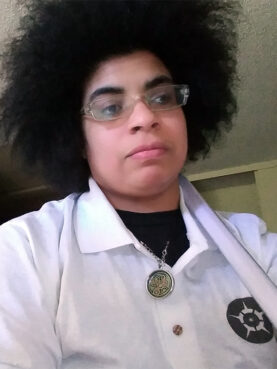
Rosalyn Johnson. Courtesy photo
“I still practice Christianity, but I was looking for a community that was a bit more open.”
The community of Jedis is chiefly online, although Johnson meets up with fellow California Jedi. Johnson interacts with members of the temple daily via an online chat forum. Each week there’s a service on Discord.
Like other religions, the Jedi Temple ushers members through important life rituals. Their ministers can perform weddings and funerals and give blessings. Jedi doctrine, Johnson said, can help members find meaning.
“A lot of people have a lot of questions — the big questions, like: Why am I here? What’s going on when I die? We can help people explore the answers,” Johnson said.
And, as a senior pastor, she runs a live online service every month on Discord.
So, what is a Jedi service? Basically a sermon, Johnson says. In the most recent service she led, she preached on corruptibility and integrity. About 15 people tune in to the live service, but many more watch the recorded sermons.
Many members are drawn to the temple seeking a religion that’s more accepting and more welcoming. The Jedi community is syncretic, blending together spiritual and philosophical practices that inspire them.
“In some Christian churches, it’s difficult to be your authentic self,” said Johnson. “Here, you don’t have to fit a mold.”
Johnson attributes her parallel Jedi religion with helping her seek a job that is others-centered, not self-centered: She currently works with people with disabilities, helping them find employment.
To address the Ewok in the room: Have most of the members been evangelized by “Star Wars”?
Johnson contends the temple’s adherents are fans of the Jedi philosophy rather than the “Star Wars” movies and are searching for real wisdom popularized by a fictional universe. While some “are very into ‘Star Wars,'” more are seeking a community studying and practicing the philosophy that George Lucas attributed to the Jedi knights.
Johnson has a set of Jedi robes she will wear for ceremonies. But she doesn’t wear them often. “I don’t think society is ready for me to walk around in my Jedi robes.”
‘That’s not a God I want to worship’ — Rev. Karla Kamstra, interfaith pastor
The Rev. Karla Kamstra was born in Kentucky, which she calls, “God’s country.” Farming and pastoring are in her heritage.
“I come from a long line of Southern Baptist preachers,” she said.
She credits her fascination with religion to her Southern Baptist grandmother.
“If my grandmother’s car was heading for the church, I was with her. I was there Sunday morning, Sunday nights, Wednesday nights,” she said.
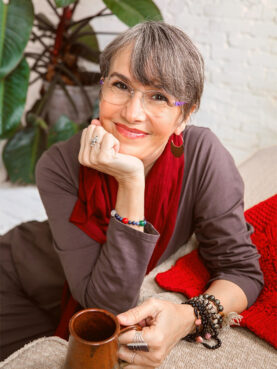
Karla Kamstra. Courtesy photo
Those early experiences left her captivated by the Bible and its teachings and in awe of preachers.
But she also remembers some of the harsh rhetoric and vengeful depictions of God with anger she heard in childhood sermons.
“I think that even at that age, I said, ‘that’s not a God that I want to worship.’”
Today, Kamstra tends a digital flock on TikTok, where she distributes videos that address religious trauma, LGBTQ affirmation and help “the spiritual but not religious find their path to God.”
She is currently closing in on 500,000 followers on TikTok. Her videos feature messages of affirmation, short sermons about religious trauma, ministering as a woman and takedowns of misogyny, racism and homophobia.
Her TikTok ministry came about after a long journey of spiritual seeking.
Kamstra and her husband searched in Baptist, Presbyterian and nondenominational churches for a spiritual home. After searching for years, Kamstra began going through a process of combing through her previous beliefs to find a spirituality that felt authentically hers. It was a process she describes as untangling rather than deconstruction.
“I kept putting God in too small of a box,” she said.
Her search for God sent Kamstra to Christian college and then to an online degree in world religions at Arizona State University. A year into that online program, she felt the call to seminary. She began attending One Spirit Interfaith Seminary in New York City and was ordained in 2017. She found the experience deeply healing:
“It’s like, I came full circle and fell back in love with Jesus again. With a healed heart.”
Kamstra felt that her journey has been a process of claiming space for herself and freeing herself from the expectations of former faith leaders. She has found on TikTok a community of people who have left religion but are still seeking spirituality. She wants to walk alongside people and give them the freedom she found by going on a very individual journey.
She believes Christ has room for her, even if Christian churches don’t.
“You can’t kick me out of the Jesus club because my experience doesn’t look like yours.”
‘A heart for rural life’ — Roger Grace, rural chaplain
Roger Grace is an ordained Methodist minister, who, since the 1980s, has been part of the Rural Chaplains Association.
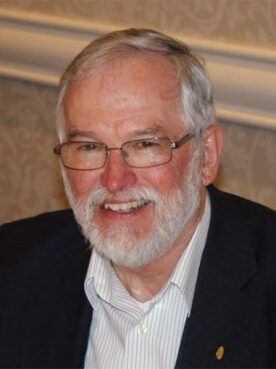
Roger Grace. Photo courtesy of UM News
A rural chaplain is anyone who feels a call to minister to people living in rural areas. The chaplains can be a layperson or someone ordained, like Grace.
“Many times people will come see the pastor or talk to a trusted lay person before they will go see a psychiatrist or psychologist,” he said.
The Rural Chaplains Association was organized in response to the farm crisis of the 1980s. Family farms were going under, and farms were being sold.
“The suicide rates were very high,” said Grace. “When a farmer loses his or her farm, not only do they lose their source of income, they lose their home, their heritage, their identity.”
The association was founded to create supportive community ties and to advocate for supportive policies. “We try to provide hope and healing for those who are experiencing pain and having difficulties in their lives,” said Grace.
The association also helps train and educate clergy and lay people in the issues of rural life, which Grace says has supplemented his work as a minister and helped him understand the crises and struggles of his community better.
The Rural Chaplains Association is celebrating 30 years of active service this year. The first cohort — of which Grace was a member — was certified as rural chaplains in 1991.
Grace grew up in rural Ohio and worked on family farms during the summers — his uncle’s farm in central Ohio went out of business in the ’80s. After seminary, Grace began serving in rural churches, about two dozen in all.
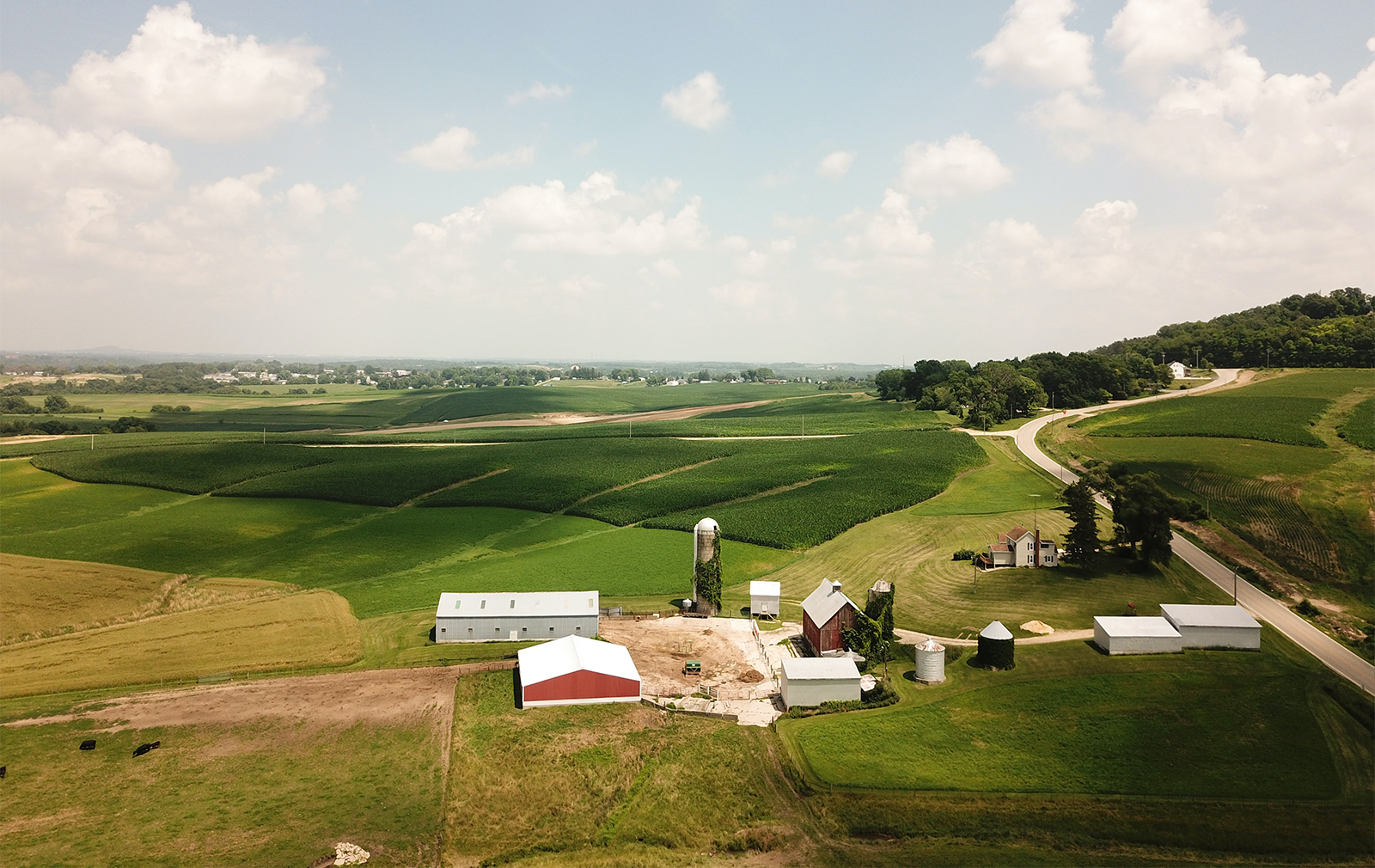
Photo by John Reed/Unsplash/Creative Commons
During the lockdowns of the COVID-19 pandemic, smaller rural churches were the last to shut down and the first to reopen. But some of Grace’s colleagues used creative means to reach parishioners who couldn’t come to church and didn’t have internet access.
One of his fellow pastors typed and printed out his sermons and mailed them out to families.
“That was quite a compromise, even in his case, because he always just wrote an outline and gave his sermon from the outline,” he said with a chuckle.
The primary requirement is that a chaplain “has a heart for rural life,” Grace said, and the ability to draw isolated and spread-out communities together.
“Lending a listening ear can — if not make things better — at least let people know they’re not alone,” he said.
‘Who am I to be offering this?’ — Lance JiGan Kaplan, Zen hospice chaplain
For Lance JiGan Kaplan, one of the biggest challenges in becoming a Zen hospice chaplain was overcoming his imposter syndrome. Although he was raised, as he describes, a secular Jew, he identified as an atheist since he was a teenager. “Who am I to be offering this spiritual support?” he wondered.
His journey from atheism to Zen began about four years ago, when his father died at 91.
Kaplan took care of his father in his final days and stayed with him immediately before and after his death.
“I didn’t realize how transformational those moments would be,” Kaplan said.
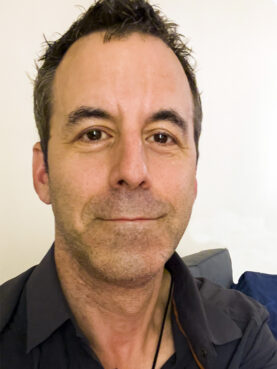
Lance JiGan Kaplan. Courtesy photo
Around this time, Kaplan was beginning to practice meditation and study Buddhism. Kaplan was put in touch with the Village Zendo in New York City and began serving with some of the Zendo’s prison ministries.
When his father was dying, Kaplan witnessed the dedication and care of his father’s hospice caretakers. At first, he thought: how could I do what they do?
“I was really inspired by the hospice workers who had taken care of my father at home,” Kaplan said. “But I thought I could never do what they did. It just seemed way beyond me.”
Kaplan has been a cinematographer for 20 years, and he still freelances part time. But after volunteering at the Village Zendo, he decided to enroll in the Zen Center for Contemplative Care’s foundations in contemplative care course and completed their clinical pastoral education. In the fall of 2020, he did clinical hours at the palliative care unit at Mount Sinai Hospital, where he has been volunteering this past summer.
Opening himself up to Zen as an atheist, Kaplan said, was an exercise in not knowing. After he encountered Zen, “the certainty of atheism seemed less interesting,” he said.
Although he slowly began to open himself up to getting sucked into suffering, Kaplan said he had to overcome fear in his clinical pastoral education.
“Death is this terrifying thing that comes up in movies. So it just seemed, like, ominous,” he said.
Kaplan said that the essential Buddhist practice that has helped him accept death was the Dyad — an exercise that trains the practitioner not to shy away from what’s happening.
“The exercise is designed to tune you into your own discomfort, and then not run away from it, but to actually explore it instead of asking, ‘How do I reflect what’s really happening?'” Kaplan found that encountering death has helped him accept discomfort. And accepting that discomfort has helped him accept being in the presence of death.
One day during his training, his supervisor at Brooklyn Hospital asked him to attend a palliative extubation — a family was removing a family member’s breathing tube in order to let the family member pass away.
A hospital chaplain is required to offer every family the opportunity for prayer. Kaplan said he was nervous about leading prayer, but his supervisor offered a simple framework of concrete communication.
“Dear Lord, I’m here with X and Y at Brooklyn Hospital. This is what I’ve heard is important to them. So we’re praying to you for this.”
Kaplan was struck by how grateful families were for this simple act of prayer and the power of that communication to create openness. “Not just to me, but openness to themselves, and to the moment.”
